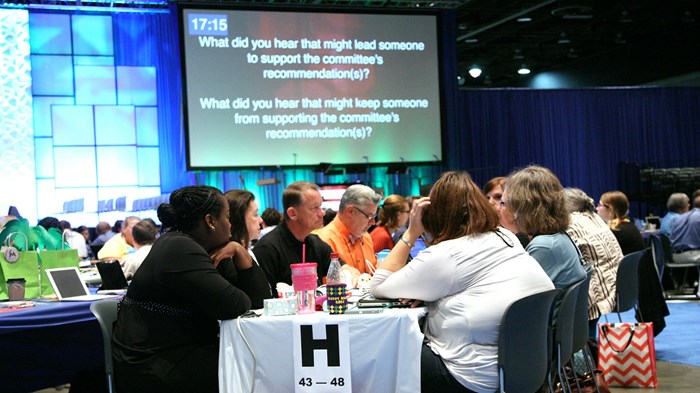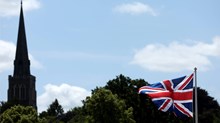
Update (July 7): The Presbyterian Church (U.S.A.) has removed the study guide Zionism Unsettled from its website.
The New York Times reports that church leaders decided the publication's availability on the church website was confusing. "As we were getting letters, email, social media, editorials, increasingly it became evident that it was confusing to people that Zionism Unsettled does not represent the views of the Presbyterian church, but divestment does," said Gradye Parsons, the denomination's stated clerk.
Religion News Service reports more details.
-----
A Presbyterian Church (U.S.A.) vote to divest from some Israeli holdings may be a largely symbolic measure by a denomination rapidly losing its symbolic weight.
The PC(USA) voted to divest from three companies—Caterpillar, Hewlett-Packard, and Motorola Solutions—that provide equipment Israel uses to raze houses, operate checkpoints and communicate in the occupied West Bank, the Associated Press (AP) reports. The decision makes the denomination one of the few in the U.S. advocating financial divestment as a peace strategy, but the denomination's shrinking membership and limited financial stake in the decision led some to question the symbolic power of the move.
The proposal, which originally called for the denomination to "Reject any proposed divestment and economic sanctions against the state of Israel or any application of the PC(USA)'s corporate engagement policies toward such ends," flipped in its final version to "Instruct the Presbyterian Foundation and the Board of Pensions of the PC(USA), to divest from Caterpillar, Inc., Hewlett-Packard, and Motorola Solutions, in accord with our church's decades-long socially responsible investment (SRI) history."
The general assembly voted to disapprove a related measure calling for a boycott of all Hewlett-Packard products.
The AP reports the church's holdings in the three companies were valued at $21 million; the companies' combined net worth is $150 billion. Only a "small fraction" of the denomination's market capitalization was invested in the companies, according to the Pittsburgh Post-Gazette.
The decision makes the PC(USA) the most prominent U.S. church to rely on divestment to pressure Israel to vacate illegally held land, according to media reports. However, they are not the largest: The 7.7 million-member United Methodist Church recently announced plans to sell its $110,000 holding in a company that provides security equipment to Israel's prison system, the AP reported.
The narrow 310 to 303 vote, which split by a larger margin than the 333 to 331 failure two years ago, may be partially the result of the denomination's shrinking number of conservatives, Mark Tooley, president of the Institute on Religion and Democracy, toldThe Washington Post.
"It's disappointing, but it's certainly not very surprising," he said. "The conservative side had been pretty unified against it, but they were largely absent this time around."
Conservatives, who are leaving the PC(USA) over issues like the recent ordinance allowing clergy to perform same-sex marriages, are part of the reason the denomination's numbers are in decline. Over the last decade, the denomination reported that it shrank by 465,000 members. The largest exodus, of 103,000 members, occurred between 2011 and 2012.
The denomination is the tenth largest in the U.S. and lost more than 25 percent of its membership in the last 20 years. Its almost 2 million members are dwarfed by Southern Baptists, the largest U.S. Protestant denomination with 16 million members in 2011. The Mormon church and Assemblies of God denominations also have higher membership numbers than the PC(USA).
The small numbers beg the question: Does the divestment even matter?
While some posit that the PC(USA)'s influence is limited, others worry that other denominations might follow their lead.
Rabbi Rich Jacobs, head of the Union for Reform Judaism, told the General Assembly before the vote that the divestment vote would be a sign that the denomination has sided with the anti-Israeli "Boycott, Divestment, Sanctions" (BDS) movement, according to Religion News Service.
"It would be an attack on the Jewish community and religion," especially in the wake of the publication of Zionism Unsettled, Jacobs said, referring to a study guide the church released to encourage "wider and deeper Presbyterian involvement with Palestinian Christians and advocating for the human rights of Palestinians under military occupation."
That study guide is available from the PC(USA) online store with a statement noting that it was produced by the Israel/Palestine Mission Network (IPMN) and that "As part of its mandate, the IPMN speaks to the church not for the church." The general assembly also passed a resolution that:
Zionism Unsettleddoes not represent the views of the Presbyterian Church (U.S.A.) and directs all Presbyterian Church (U.S.A.) entities to express this statement in all future catalogs, print or online resources.
The PC(USA) distances itself from the BDS movement in the rationale for their decision, where the committee notes that "Long-standing PC(USA) policy supports a two-state solution, making support of the international BDS movement incompatible and counterproductive," and that the divestment "is not to be construed or represented by any organization of the PC(USA) as divestment from the State of Israel, or an alignment with or endorsement of the global BDS (Boycott, Divest and Sanctions) movement."
Israeli Prime Minister Benjamin Netanyahu said the vote was misguided and unfair, according to the AP. He urged international Jewish journalists to "defeat a lie … with truth."
"When the Middle East is fragmented in this horrible war, this savage, savage war between militant Shiites and militant Sunnis … the only place where you have freedom, tolerance, protection of minorities, protection of gays, protection of Christians and all other faiths is Israel," he said.
The PC(USA)'s Middle East committee also:
- approved an overture instructing the Advisory Committee on Social Witness Policy to provide a history of General Assembly policies favoring a two-state solution in Israel-Palestine and to prepare a report to the 222nd Assembly (2016); and
- disapproved of an overture affirming the human rights of Israelis and Palestinians but calling Israel an apartheid state.
CT often covers the PC(USA), including the recent vote to permit pastors to perform same-sex marriages, an online announcement that one man said led to his torture and near beheading, and the more-or-less amicable way the Presbyterian church treats departing congregations.

Support Our Work
Subscribe to CT for less than $4.25/month


















